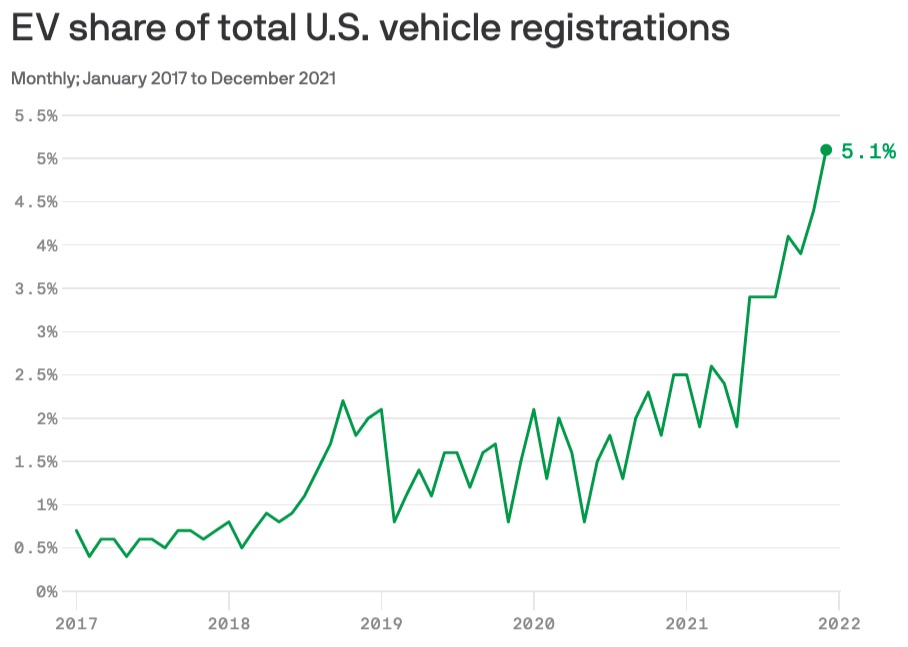Despite growing competition Tesla EV supremacy in the US appears to be secure.
Monday, June 27, 2022 | Chimniii Desk
Although there are many new and seasoned automakers entering the electric vehicle industry today, Tesla's hold on the American EV market is still solid.
The first contemporary electric vehicle was not made by Tesla; instead, it was the short-lived EV1 from General Motors. With the original Roadster and the Model S sedan, Tesla, however, was the company that actually bet everything on EVs and helped to launch the contemporary electric vehicle revolution.
Since then, EVs' market share in the US has increased. Over the past year, the number of electric car registrations in the US has doubled to account for nearly 5% of all new vehicle registrations. Customers now have a significant selection of EV options from several automakers.
Advertisement
According to Axios, the transition away from gasoline-powered cars will take years to materialise in the US. Additionally, it is clear that EV adoption is rising, particularly in states like California and other cities in the Northeast, Florida, and Texas, using monthly vehicle registration data from S&P Global Mobility.
One thing is still clear in light of car registration data: Tesla appears to be in a secure position to dominate the electric vehicle market. In April, the most recent month for which figures are available, the company's vehicles made up nearly 61 percent of all electric cars registered in the United States.
At least for the moment, the race is not close. Ford, Hyundai, and Kia are Tesla's main rivals, each accounting for 6% of the market, 8% of the market, and 6% of the market, respectively. Due to low production, even well-known EVs from established automakers like the Ford Mustang Mach-E and F-150 Lightning haven't made much of an impact.
Advertisement
/cdn.vox-cdn.com/uploads/chorus_image/image/69564917/jbareham_180213_2301_0149.0.jpg)
Advertisement
With 14,152 orders placed by itself in April, the Tesla Model Y outsold the Mustang Mach-E (3,287) by a factor of four.
Although Tesla's superiority appears to be completely certain, there are concerns. This is because the Model 3 sedan and the Model Y crossover are essentially holding the firm back from a full wave of competition. Since their updates in early 2021, other models in its portfolio including the Model S and Model X have not yet reached full ramp, while initiatives like the Cybertruck, Semi, and Roadster are behind schedule.
Then again, according to Tom Libby, an analyst at S&P Global Mobility, Tesla has a "halo surrounding the brand that is outstanding and unique." In addition, competitive electric vehicles from rival automakers "are not lighting the world on fire," according to Libby.
The Hummer EV, which is a scarce vehicle, is an example of this. Volkswagen's ID.4, which could compete with the Model Y, hasn't exactly impressed. Potential powerhouses like the VW ID. Buzz have not yet reached American soil. On the other hand, rivals from young businesses like Rivian have encountered constraints because of chip shortages and supply chain problems.
According to predictions made by consulting firm AlixPartners, the market share of electric vehicles in the US might increase to 28 percent by 2028 and up to 59 percent by 2035, taking into account the sector's speed in the country.
